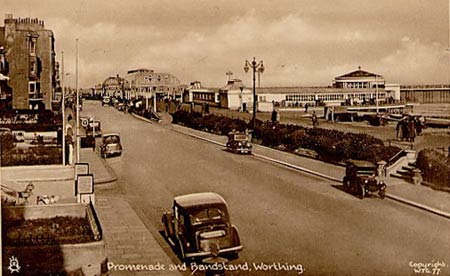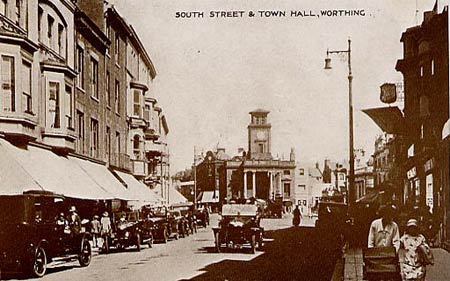|
This article was first published in the West Sussex Gazette on 16th June 1994
In the first part of Peter Longhurst's childhood recollections he described the West Grinstead farmhouse in which he was born as having no mains services at all --- not even tap water --- and told of his father, an agricultural worker, and his uncles who farmed there.
In the late 1920s, work on the farm began to dwindle, then when Peter's paternal grandmother died the whole family left and went their separate ways. Peter moved with his parents and sister Betty to Portland Road in Worthing, where they lived in accommodation above stables in Portland Road, roughly where Portland Market is now.
Peter who was then still pre-school age remembers donkeys being stabled there, and their owner giving rides along the beach.
At the same time, Peter's maternal grandmother 'Grandma Roberts', married to a military man in the Indian Army, lived in a house not far away --- a big house set in its own grounds with a sign facing Richmond Road declaring 'ancient lights'. Here she ran a guesthouse, often putting up visiting military bandsman playing at the bandstand.

The Bandstand and Enclosure in the 1930s where visiting military bands played. Today it is The Lido.
|
After a couple of years or so at Portland Road Peter's family moved to 95 Clifton Road, a home lit by wall-mounted gas lights --- a vast improvement on the farmhouse where oil lamps were used. 'Out the back was a big copper, mum used for washing,' reminisced Peter.
It was around 1931 when Peter was an infant at Holy Trinity School in Howard Street and the country was in the depths of the Great Depression his father George fell on particularly hard times. A builders' labourer since first arriving in Worthing from the country, even work in that trade slackened right off despite cycling to all the building sites he could in search of any work, taking with him a home-made tool bag he had crafted from old carpet with a wooden bottom. He was unable to find any work. There was just no money in the family. The only safeguard from destitution then was to go 'on the parish' as it was called. The authorities would send someone round to assess your need, but if they found any article not essential for your survival, financial help was refused. In George's case they spotted a wind-up gramophone with a horn in the living room and told him to sell it.
Peter recalls the weekday lunch in those days, a time before school meals or free school milk: 'We went home for a midday meal of bread and Oxo, all mixed up to make a bowl of soup --- and that was it.'
With dad unemployed, Christmas for the Longhurst family was far, far different from anything we know these days. There were no family gifts for the children. But Peter does remember going to choose a present from a selection of hand-me-downs in the town centre. 'Mother took me to the old town hall facing down South Street. We climbed the steps to the entrance which seemed huge to me as a child, and their mother was issued with a ticket for each of us children. Inside was like an Aladdin's Cave, trestle tables were laid out like market stalls displaying second-hand toys donated by better-off families, where we could select a gift in exchange for a ticket.'

The old town hall and its conspicuous clock tower facing down South Street: Here in the early 1930s, poor mothers selected a Christmas gift for each child from second hand toys donated by the better off.
|
Peter remembers clearly getting a tin clockwork steamroller and how excited he was. 'A toy for Christmas. That was wonderful. Didn't get much else in those days. We believed in Father Christmas and used to spend a lot of time at the bedroom window looking out for him on his sleigh. For us, Christmas just wasn't Christmas as we know it today.'
Yet despite the comparative poverty of those times crime was nowhere near as prevalent as it is today. 'People were pretty honest then. You didn't have to worry about locking your doors in those days. Neighbours would just knock and walk in when they wanted to call on each other.
'Let's face it, we were all in the same boat. None of us had anything worth pinching anyway.'
'We were quite content and made sure we enjoyed ourselves.'
In the third chapter of Peter's intriguing and interesting memories we find out that he was struck down by a contagious fever and interned for a long time, and we learn how youngsters had their tonsils out in the days before facilities were provided at Worthing hospital.
| |


